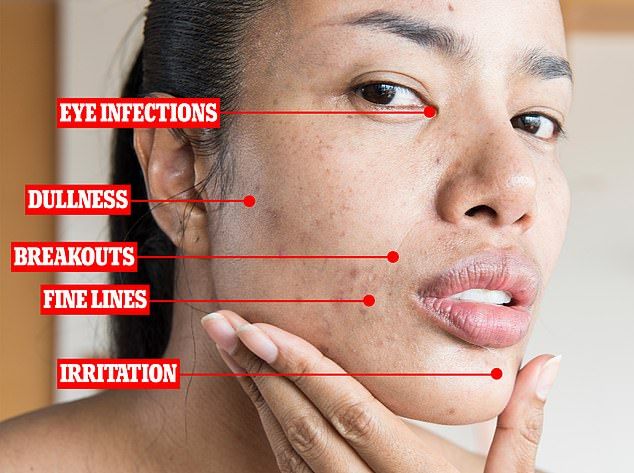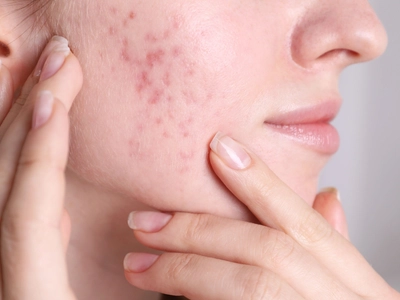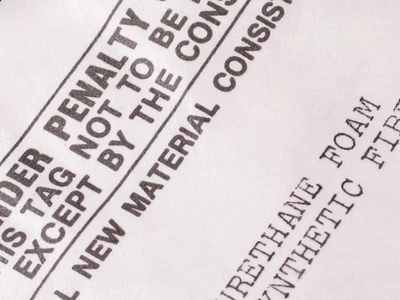The Shocking Truth About What Happens to Your Skin When You Sleep With Makeup On (Doctors Won't Tell You This)
Every night, millions of people unknowingly transform their pillows into breeding grounds for bacteria, their pores into clogged sewers, and their skin into a battlefield. What seems like an innocent decision to skip your skincare routine or delay washing your sheets is actually setting off a cascade of hidden health consequences that most doctors never warn you about.
Why Your Makeup Becomes a Toxic Mask While You Sleep
When you sleep with makeup on, you're essentially suffocating your skin for 6-8 hours straight. Your foundation, concealer, and powder create an impermeable barrier that traps dead skin cells, oil, and bacteria against your face. This deadly combination doesn't just cause a few pimples – it triggers a domino effect of skin destruction.
The immediate consequences include:
- Clogged pores that expand and deepen overnight
- Bacterial infections that spread across your face
- Inflammation that damages your skin's natural barrier
- Irritation that can lead to painful cysts and nodules
But the real horror lies in what happens over time. Sleeping in makeup accelerates collagen breakdown, causing your skin to age twice as fast. The constant barrier prevents your skin from completing its natural repair cycle, leading to permanent damage that no amount of expensive skincare can reverse.
The Microscopic Army Living in Your Pillowcase
Your pillowcase harbors more than just makeup residue – it's a thriving ecosystem of dust mites, bacteria, and dead skin cells. These microscopic creatures feast on the oils and dead skin you shed every night, multiplying into colonies that can reach hundreds of thousands.
What's breeding in your bedding:
- Dust mites that trigger allergic reactions and skin irritation
- Staphylococcus bacteria that cause serious skin infections
- Fungal spores that lead to persistent rashes
- Bed bugs that leave painful, itchy welts
The Cleveland Clinic warns that these tiny invaders can cause everything from acne breakouts to serious respiratory problems. Yet most people wash their pillowcases only once a week – or worse, even less frequently.
The Hidden Connection Between Sleep Hygiene and Chronic Health Problems
Poor sleep hygiene creates a perfect storm of health issues that doctors rarely connect to your bedtime habits. When your skin can't breathe and repair itself properly, it sends stress signals throughout your body, triggering inflammation that affects your entire system.

The cascading health effects include:
- Compromised immune function that makes you more susceptible to illness
- Hormonal imbalances that affect mood, weight, and energy levels
- Increased cortisol production that accelerates aging
- Disrupted sleep patterns that compound every other health problem
The Acne-Aging Double Whammy
Sleeping with makeup doesn't just cause teenage-style breakouts – it creates a vicious cycle where your skin ages rapidly while simultaneously breaking out. The makeup residue mixed with overnight oil production creates the perfect environment for aggressive bacteria that cause deep, painful cysts.
These aren't surface-level pimples that disappear in a few days. They're inflammatory lesions that damage your skin's structure, leaving permanent scars and contributing to premature wrinkles. The constant inflammation also breaks down elastin and collagen, the proteins that keep your skin firm and youthful.
The Makeup Trap That's Aging Your Skin Overnight
Foundation and concealer contain ingredients that become increasingly problematic the longer they stay on your skin. Silicones create an airtight seal that prevents natural oil regulation, while preservatives can cause allergic reactions when left on overnight.
Water-resistant and long-wearing formulas are the worst offenders. These products are designed to withstand sweat, tears, and daily activities – imagine what they do to your skin when left on for 8+ hours in a warm, humid environment.
What Your Doctor Isn't Telling You About Sleep-Related Skin Damage
Most dermatologists focus on treating the symptoms rather than addressing the root cause. They'll prescribe antibiotics for your acne, retinoids for your aging, and moisturizers for your irritation – but they rarely ask about your sleep hygiene habits.
The truth is that many persistent skin problems stem from preventable bedtime behaviors. Patients spend thousands on treatments while continuing the very habits that caused their problems in the first place.
The Hidden Costs of Dirty Bedding
Beyond the obvious skin problems, dirty sheets and pillowcases create a contaminated environment that affects your overall health. The bacteria and allergens don't just stay on your skin – they get into your respiratory system, causing problems that seem completely unrelated to your bedtime routine.

Unexpected consequences include:
- Chronic congestion and sinus problems
- Recurring respiratory infections
- Worsened asthma and allergies
- Disrupted sleep that affects mental health
- Increased risk of serious skin infections
The 72-Hour Rule That Changes Everything
Research shows that skin damage from sleeping in makeup compounds exponentially after just three nights. What starts as minor pore congestion becomes deep-seated bacterial infections that can take months to heal.
The bacteria that accumulate on your pillowcase follow a similar timeline. After 72 hours, the microbial load reaches dangerous levels that can overwhelm your skin's natural defenses.
Breaking the Cycle: The Non-Negotiable Bedtime Rules
The solution isn't complicated, but it requires absolute consistency. Your skin's overnight repair cycle depends on a clean, breathable environment free from makeup, bacteria, and accumulated oils.
The essential steps:
- Remove ALL makeup before bed – no exceptions, no matter how tired you are
- Change your pillowcase every 2-3 days minimum
- Use a gentle cleanser to remove residual makeup and daily pollutants
- Allow your skin to breathe and repair overnight
- Wash all bedding in hot water weekly to kill bacteria and dust mites
The Bottom Line: Your Bedroom Is Either Healing or Harming You
Every night, you make a choice that affects your skin's health for years to come. The consequences of poor sleep hygiene aren't just cosmetic – they're medical issues that can lead to serious infections, permanent scarring, and accelerated aging.
Your pillowcase, your makeup routine, and your bedtime habits are either supporting your skin's natural healing process or sabotaging it. The microscopic damage happening every night adds up to visible, lasting consequences that no amount of expensive skincare can undo.
The question isn't whether these habits affect your health – it's whether you're willing to change them before the damage becomes irreversible.








